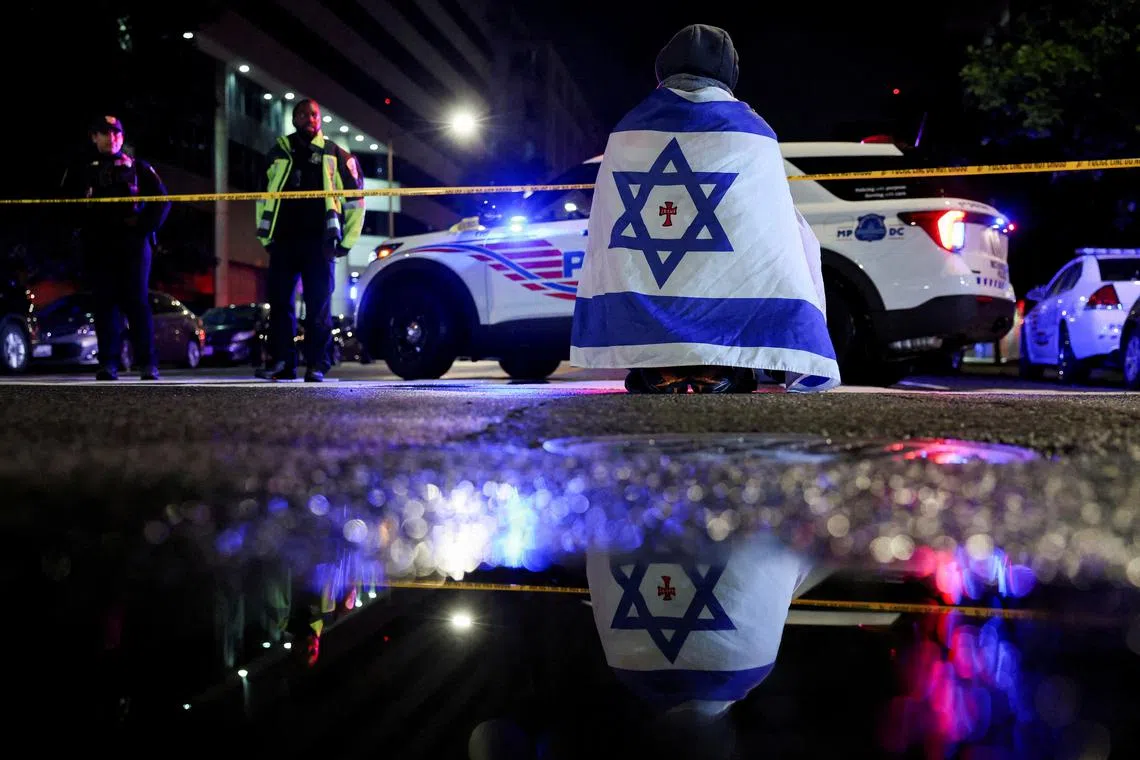After shootings, Washington’s Jewish community looks to bolster security
Sign up now: Get ST's newsletters delivered to your inbox

A fatal shooting at a Jewish museum has deeply shaken the US capital's Jewish community.
PHOTO: REUTERS
Follow topic:
WASHINGTON – When Mr Adam Zimmerman chaperoned his son’s fourth-grade class field trip to the natural history museum in Washington on May 21, he did not give a second thought to security.
Hours later, outside a different museum a few kilometres away, two Israeli embassy employees were gunned down
“It was a horrific reminder for me – as a Jewish parent in this city – that we all have to be looking over our shoulders all the time,” said Mr Zimmerman, 43, a media consultant from Rockville, Maryland.
The fatal shooting of the young couple after an event at a Jewish museum has deeply shaken the US capital’s Jews and has led to a review of security protocols at synagogues and other institutions.
“The same seeds of anti-Semitism that led to Europe in the 1930s and 1940s are still killing people on the streets of Washington, DC, in 2025,” said Mr Zimmerman, whose grandparents were Holocaust survivors.
It was the latest act of violence aimed at Jewish Americans linked to outrage over Israel’s escalating military offensive in Gaza, a response to the October 2023 attacks by Hamas militants that killed 1,200 in southern Israel.
The Washington shooting took place outside the Capital Jewish Museum, where the American Jewish Committee was sponsoring an annual young diplomats reception.
The lone suspect, who was charged with two counts of first-degree murder on May 22, according to court records, told the police on the scene: “I did it for Palestine, I did it for Gaza.”
Mr Alan Ronkin, regional director of the American Jewish Committee’s Washington office, said security was tight at the event, even though the suspect, Elias Rodriguez of Chicago, managed to enter the museum in the chaos that ensued in the aftermath of the shooting outside. He was apprehended inside.
“We are going to revisit our security protocols and make sure we follow the recommendations of the experts,” he said, adding that the community was “shaken but resilient”.
Mr Ron Halber, chief executive of the Jewish Community Relations Council of Greater Washington, said that local law enforcement has increased patrols around Jewish institutions in Washington since the killings.
“A lot of us are looking over our shoulder today,” he said. “But we have to keep leading proud open Jewish lives. I’m certainly not going to let it deter me from any public or private event.”
Most Jewish institutions in the city already have robust security, including armed guards at most synagogues, according to Mr Halber.
“The big discussion that’s going to happen is how long does the perimeter extend – one block, two blocks,” he said.
Mr Gil Preuss, CEO of the Jewish Federation of Greater Washington, said: “Every Jewish organisation is increasing their security, whether it’s having more guards standing outside during more hours of the day, or if they didn’t have any, adding them.”
He added: “Right now it’s short term, and we’ll see whether there’s a permanent change in the level of security. My guess is yes.”
The federation is one of several Jewish institutions that on May 23 said they were fund raising to bolster security.
Local and federal grants, especially a non-profit security grant programme administered through the Federal Emergency Management Administration, are a “tremendous” help to offset the costs of security improvements, according to Mr Preuss.
After some delays and confusion due to the Trump administration’s federal funding freezes in recent months, the programme’s grant funding has started flowing again, he said.
About 50 Jewish organisations issued a statement on May 22 calling on the US Congress to increase funding under the Nonprofit Security Grant Programme to US$1 billion (S$1.28 billion), more than double the current figure.
‘Desire to be together’
Rabbi Sarah Krinsky, at Adas Israel in Washington, said on May 23 that there were DC Metropolitan Police Department cars outside her synagogue, at the end of the block and at the base of the carpark.
She said the 2018 Tree of Life Synagogue shooting that killed 11 worshippers in Pittsburgh first prompted Adas Israel to boost security significantly.

Police officers working at the site where two Israeli embassy staff were shot dead, in Washington, DC, on May 21.
PHOTO: REUTERS
Since the May 21 attack, the Washington mayor’s office, police department, Federal Bureau of Investigation and private firms have all recommended even higher levels of security.
Rabbi Krinsky said the conservative congregation’s more than 3,500 members would welcome the “slight enhancements”, details of which she could not discuss.
With the shock of the shooting still raw, she said she expected a big crowd for Shabbat services this weekend.
“There’s a real desire to be together, and to be in a place where people can mourn and grieve and express everything they’re feeling and feel safe and held.” REUTERS

